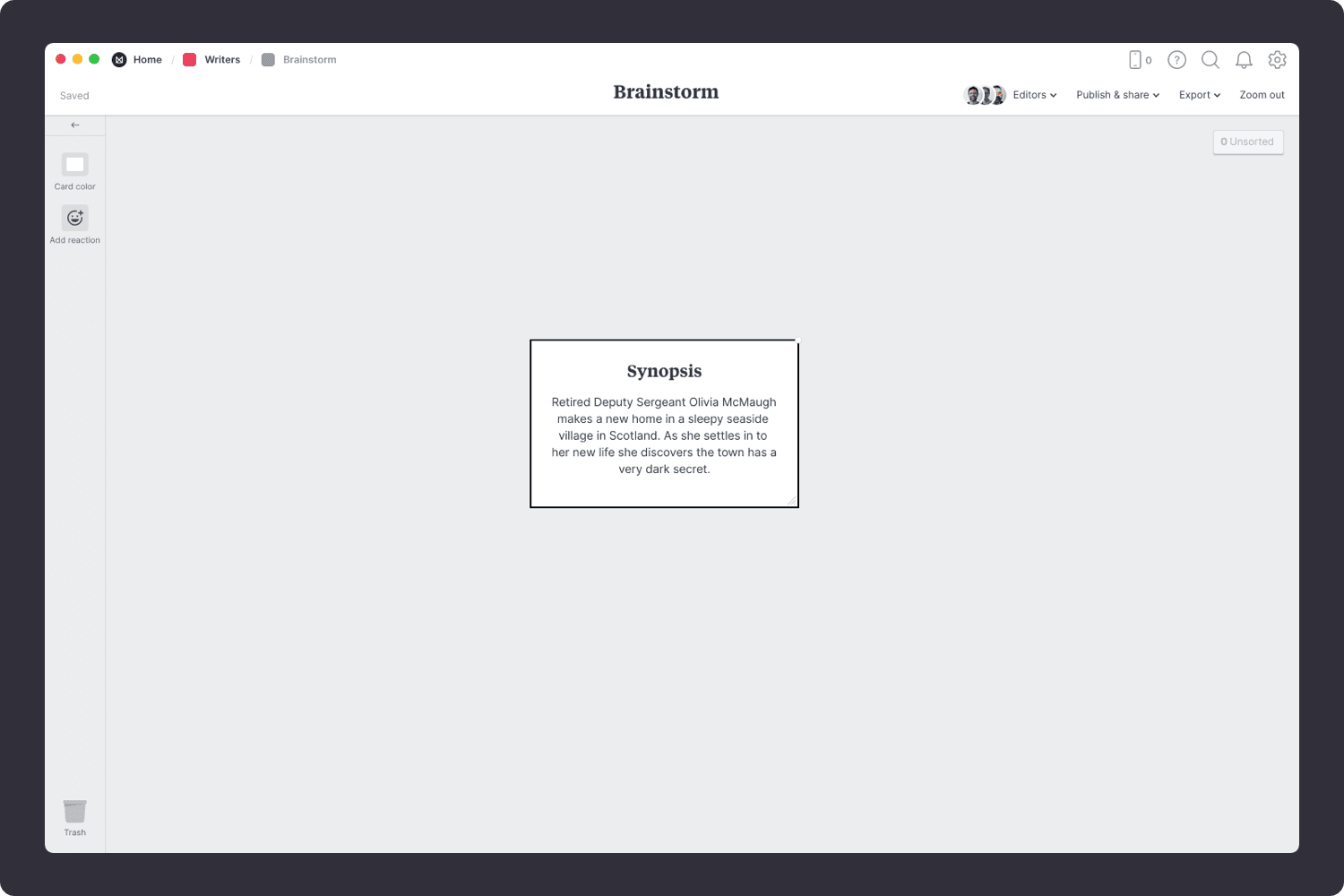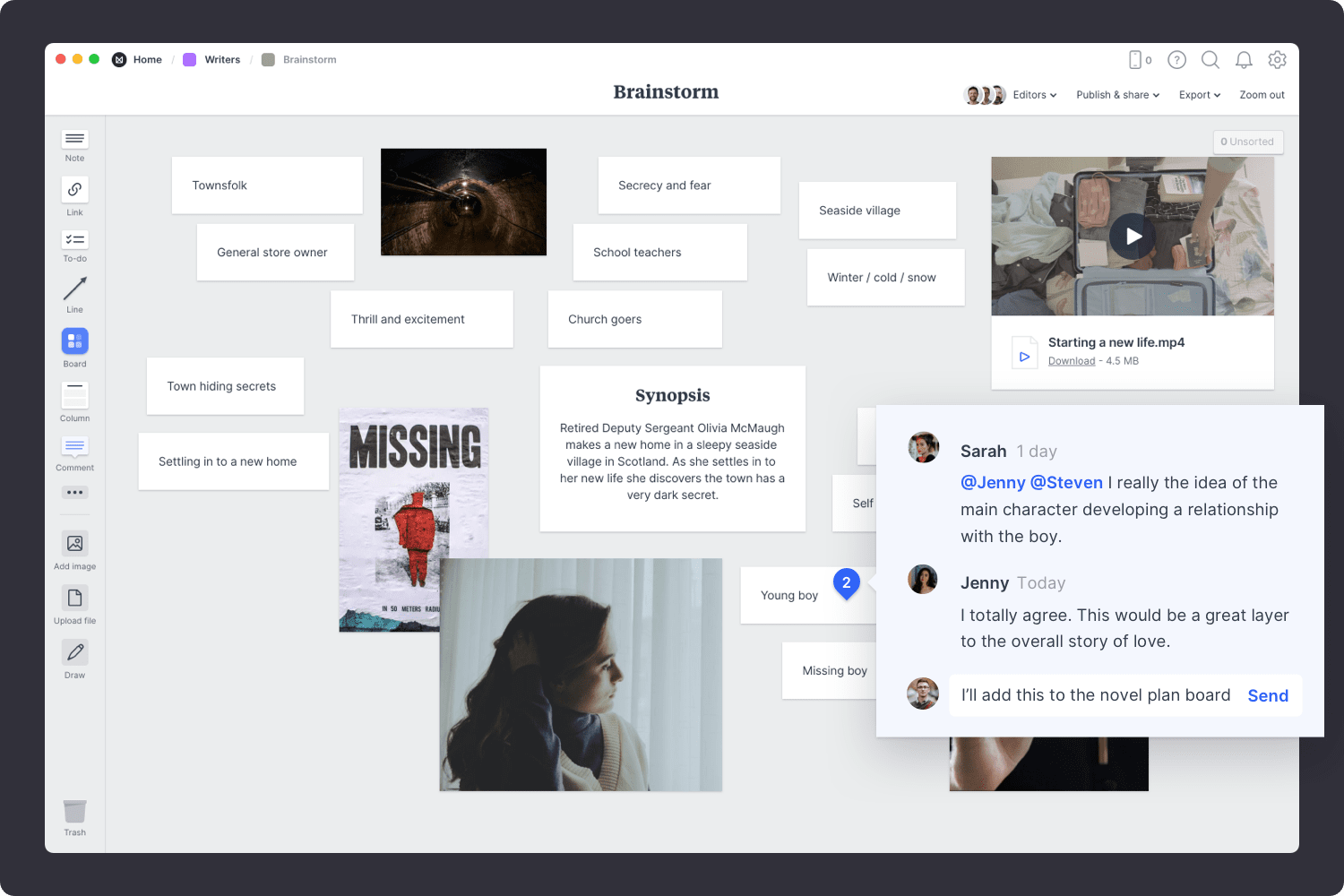Start Brainstorming
Get started for free with Milanote's easy to use brainstorming template.
Start BrainstormingSign up for free with no time limit

Follow this step-by-step guide to learn the modern process of brainstorming in Milanote, a free tool used by top creatives.

You have an idea for a story. It's just a spark at the moment, but you can't stop thinking about it. Now is the time to harness your creative energy and turn your idea into something real. And brainstorming is the perfect technique for the job.
Brainstorming is a classic creative technique for generating new ideas quickly. You can use it to dream up new characters, settings, or even explore themes you want to include in your book. It’s best thought of as a way to light up our imagination. As ancient philosopher Plutarch said, “The mind is not a vessel to be filled, but a fire to be kindled.”
In this guide, you'll learn the modern approach to brainstorming using Milanote. Remember, the creative process is non-linear, so you may find yourself moving back and forth between the steps as you go.
What's the central idea or concept for your story? This is your starting point. It might be just a rough idea at the moment or a topic that you want to explore, but this process will help you see how far you can take it. Add a note that describes your concept in 1 to 2 sentences to get started.

Create a new board for brainstorming.
Drag a board out from the toolbar. Give it a name, then double click to open it.
Add a note to describe your central idea.
Start typing then use the formatting tools in the left hand toolbar.
Now it's time to get creative. Start adding any ideas that relate to your main concept. Think about different parts of your story, locations, characters, or even the history of your topic. Explore every thread until you fill the board.
Don't worry about evaluating your ideas yet, that will come later. Just add as many as you can. Setting a timer for 5 minutes is a great way to create a sense of urgency and prevent you from judging your thoughts.

Add a note for each idea.
Start typing then use the formatting tools in the left hand toolbar.
Sometimes it's easier to communicate an idea with an image, especially if it's a mood or style you're trying to express. Images can help define things like fashion, character attributes and emotions, scenes, and more. These can become the foundation for a moodboard as your story evolves.

Use the built-in image library.
Search over 3 million beautiful photos powered by Pexels then drag images straight onto your board.
Drag images from your computer onto the board.
Click the "Upload file" button or just drag a file onto your board. You can add images, logos, documents, videos, audio and much more.
You can also use video references to bring your ideas to life. If you're inspired by a scene in a film or a piece of music, add it into the mix. This part is solely about collecting ideas. Grab video from YouTube, or even audio from Soundcloud to help capture your ideas.

Embed Youtube videos or audio in a board.
Copy the share link from Youtube, Vimeo, Soundcloud or many other services. Drag a link card onto your board, paste your link and press enter.
Now’s the time for critique. Run through the ideas again, this time critically evaluating them against the original concept.
If you have a writing partner, ask them to choose their favorite ideas and explain why. Be prepared to share your thinking and welcome suggestions and improvements. Encourage constructive debate. If an idea isn't dramatically improving the story, put it aside. You can always return to it later.

Invite a writing partner to collaborate.
Open the "Editors" menu from the title bar of your board. Add email addresses of the people you'd like to collaborate with—they'll receive an invitation via email.
Start a comment thread.
Drag out a comment from the toolbar on the left and place it on your board. Other editors can reply to your comment.
Mention others to get their attention.
Type '@' in any text field to mention someone who has access to your board. They'll receive a notification and be able to respond to your comment.
Once you've explored tangents and shared feedback, the next step is to make connections. This is where you see the magic of brainstorming.
Start by grouping similar ideas to uncover patterns in your thinking. Add a title to each group so it's easy to scan. You might find your ideas fall into groups like story, location, characters, or scenes, but there are no rules about how you do it. Now you should start to see your initial concept coming to life.

Drag content to create groups of similar ideas
Now that your brainstorming session is complete, you have a strong foundation for your novel! Remember, just as creativity and inspiration are constantly evolving, so are ideas. Come back and add to the brainstorm when inspiration strikes. Use the template below to start brainstorming or read our full guide on how to plan a novel.
